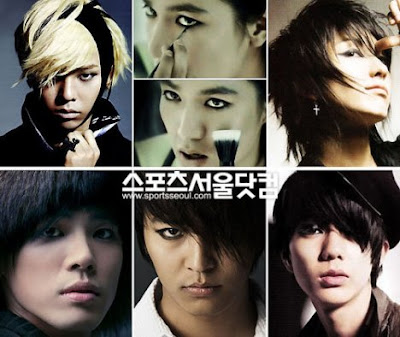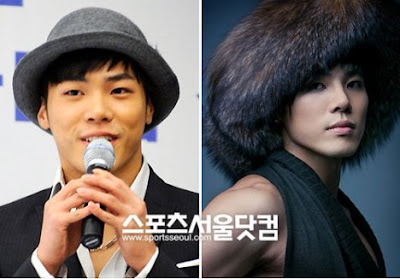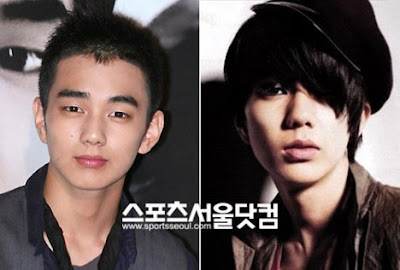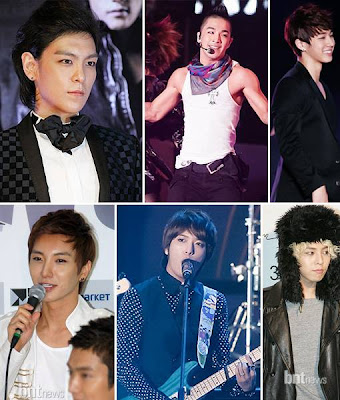Oct 14, 2010 Author: admin | Filed under: Korean Make Up

Smoky makeup has very popular in Korea male idol nowadays. Smoky eyes have become a classic party eye makeup look. The secret of this trend’s popularity is that smoky eyes can change your face dramatically, transforming the boy next door idol into a wild manly hot guy.
Who are the celebrities that are famous for their smoky makeup? From a short while ago , Brown Eyed Girls’ member Gain, Lee Hyori, and 2NE1‘s Park Bom are the girl idols who are famous for their makeup. However, for the new smoky make-up style these male idol groups come up first; Big Bang, 2PM, B2ST, U-KISS. Recent care in the fashion and beauty have resulted in “grooming” idols and thicker make-up.
Among male idols, the “eyeline” has become a trend. Big Bang’s T.O.P brought the popularity of the eyeline among male idols, by looking more bolder and stronger. While Big Bang were doing individual activities, 2Pm, B2ST, MBLAQ, ZE:A , and U-KISS brought their own style of “bold eyeline”. Singer Rain, brought a bolder look with his drawn eyelashes.

While Smoky Makeup is the best way to show one has already turned from boy into man. There are male stars who are further emphasizing their sexy charm with edgy smoky make up. Woman’s heart wavers at their dark eyes.
When we look at idol group members today, we feel that they’ve somehow matured. In addition to their singing, masculine style complete their masculinity. Among them, dark smoky make up definitely works the magic.
One of the first idol groups to use smoky eye makeup is Big Bang. T.O.P’s sexy charisma was emphasized with his thick eyebrows and smoky make up. Taeyang also followed the style while promoting “I Need A Girl” in order to give off the feel of maturity.
The style is also highly effective for Jung Yong Hwa’s signature gazes towards the camera, easily enabling him to capture the audience.
Super Junior’s Lee Teuk and Big Bang’s G Dragon are known pretty boys of the industry for their soft looks. By wearing smoky eye makeup, the two were able to upgrade their manliness by giving off a sharp feel from their eyes.
Smokey Eyes, from cute boyish into fierce and wild
 Lee Min Ho
Lee Min Ho
In the Entertainment business, Beastly Idols with makeup is the Trend. In dramas, the actors focus on their abs, while for the artists, fans are won over by both the abs and thick eyeliner worn by Beastly Idols. For 3-4 minutes, the singers have to show off a strong performance, especially for the beastly idols who have become the trend for the entertainment buisness.
For several cute and boyish idol, Smokey Eyes are effective to turn their appearances becoming totally different. The example idols are
Lee Minho and Onew. The makeup also gives a deeper edge to Minho’s cute boyish charms, along with giving Onew a more fierce image on stage compared to his innocent, calm features without it.
The members of MBLAQ use the style often when wearing black suits, easily capturing the attention of the audience with their clean, sharp style.
Some of Korean Male Idol in Smokey Eyes make up
 Eunhyuk
Eunhyuk
 G Dragon
G Dragon
 Jang Geun Suk
Jang Geun Suk
 Kim Jeong Hoon
Kim Jeong Hoon
 Lee Jun Ki
Lee Jun Ki
 RyeoWook
RyeoWook
 Big Bang’s T.O.P brought the popularity of the eyeline among male idols, by looking more bolder and stronger.
Big Bang’s T.O.P brought the popularity of the eyeline among male idols, by looking more bolder and stronger.
 Wheesung
Wheesung
 Yoo Seung Ho
Yoo Seung Ho



















